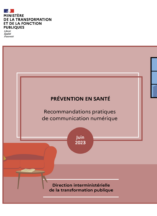This project was conducted in 2022-2023 as part of our framework agreement with the Directorate for Government Transformation (DITP). We assisted the DITP’s behavioural sciences unit following a sollicitation from the Délégation du Numérique en Santé (DNS) and the national fund for health insurance (CNAM) in order to help them explore the potential impact of their the national digital medical platform (Mon Espace Santé) to encourage people to go to their preventive health checkups.
In the context of the launch of Mon Espace Santé (MES), a digital health platform designed to centralise an individual’s health information, the DNS and the CNAM sought to investigate its capacity to promote preventive health behaviours. We partnered with them in a project consisting of two main phases: (1) the creation of a guide on the use of behavioural sciences to promote health prevention on digital health platforms, and (2) the design and evaluation of a behavioural intervention to encourage breast cancer screening among women aged 50 to 74 through MES.
Breast cancer prevention was chosen for its potential of impact, notably given the low participation rate (below 50%) in France between 2021 and 2022. To better understand the barriers contributing to this low participation to breast cancer screening rate, we conducted an online experiment with 2,394 women and conducted focus groups with 25 participants from across France. The results highlighted several key insights:
- Fear of screening: nearly half of the surveyed women expressed anxiety about undergoing screening, attributing it to an event that would reveal the disease rather than prevent it. Some also mentioned fear related to the procedure itself.
- Doubts regarding the effectiveness of screening: only two-thirds of the surveyed women believed that screening “significantly” increases the chances of detecting cancer at an early stage. Moreover, nearly half of them (44%) underestimated the chances of recovery in case of early detection.
- An intention to action gap: while 90% of women declare their intention to undergo screening, the most commonly cited reasons not to, are procrastination, forgetfulness, and lack of time, suggesting an issue with “taking action” rather than a lack of motivation.
In light of these obstacles, several interventions appear promising:
- Encouraging social circle involvement: involving close friends and family in discussions about breast cancer screenings can reassure women and ease their concerns.
- Avoiding alarmist messages and emphasising the benefits of screening: instead of focusing on the consequences of late detection, highlighting the benefits of early screening is crucial. Providing information on its effectiveness and positive impact on survival chances can also alleviate doubt.
- Making it easy: streamlining procedures and getting rid of frictions is essential. For example, tools facilitating online appointment booking or sending personalised and automated reminders, can help simplify the screening process.
Digital platforms with extensive outreach, such as Mon Espace Santé, can play a crucial role in encouraging a more systematic approach to breast cancer screening in France.






